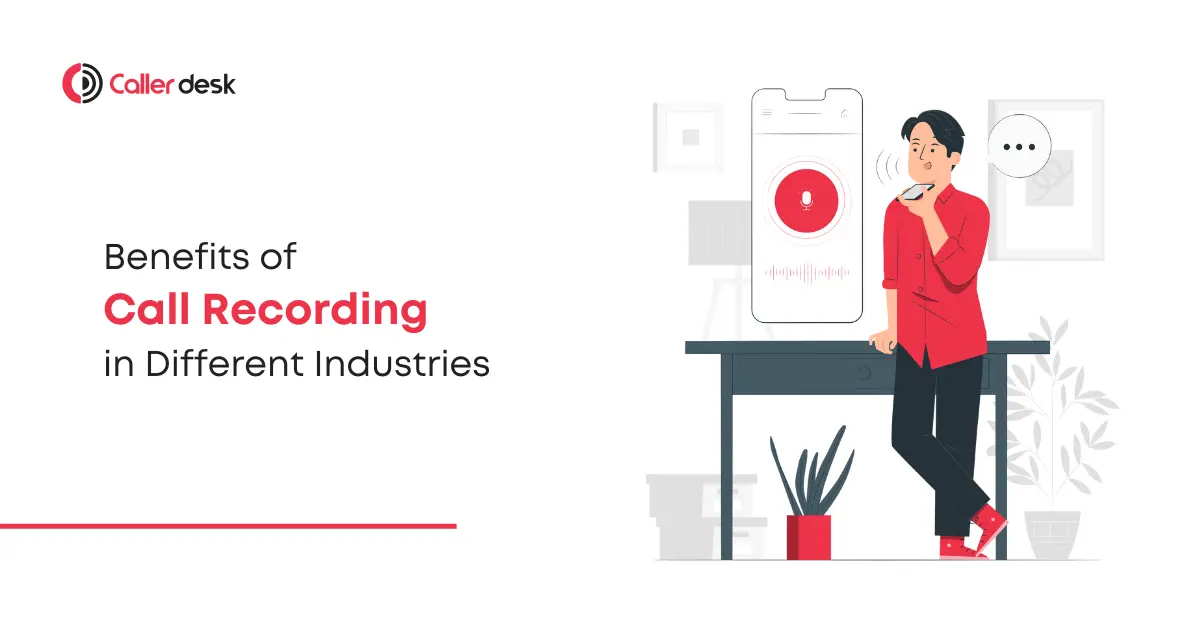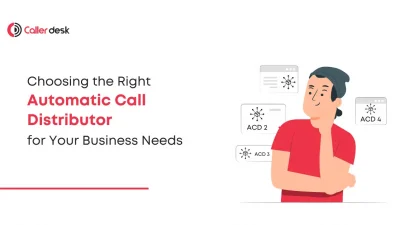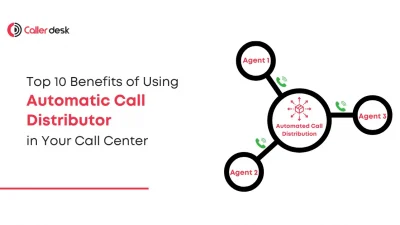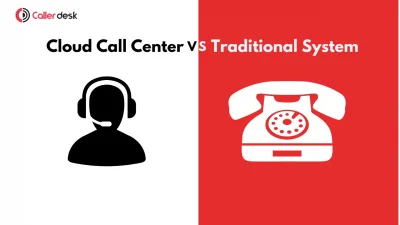Did you know that poor communication costs businesses an estimated $75 billion annually? Misunderstandings during a phone call can lead to errors, unhappy customers, and even lost revenue. Imagine a hospital miscommunicating critical treatment details or a bank mishandling loan discussions. The consequences can be serious.
Here’s come call recording—a powerful tool that ensures every conversation is captured, analyzed, and utilized effectively. Call recording doesn’t just document conversations; it provides insights that help businesses enhance customer service, resolve disputes, and train their teams.
Whether you’re running a healthcare facility, a financial institution, or an e-commerce business, call recording is an essential part of modern communication. In this guide, we’ll explore how call recording benefits key industries, improve business efficiency, and strengthen customer relationships.
Why Call Recording is a Must-Have for Businesses
Call recording acts as a digital archive for your business. It’s a tool that ensures nothing is left to chance. Here’s how it helps businesses succeed:
- Accuracy: Capture and review important details like dates, amounts, or instructions to avoid costly errors.
- Training Tool: Use real conversations to teach your employees how to handle challenging situations.
- Quick Dispute Resolution: Resolve conflicts efficiently with evidence of what was actually said.
- Data-Driven Insights: Analyze recorded calls to identify trends, improve customer interactions, and make informed decisions.
- Transparency and Trust: Build confidence with customers by maintaining clear records of interactions.
No matter the industry, having a reliable call recording system ensures smoother communication and better outcomes for all parties involved.
How Call Recording Benefits Different Industries
1. Healthcare: Precision in Patient Communication
Healthcare is an industry where the stakes are incredibly high. Every call might involve critical information about a patient’s health or treatment plan. For example, a doctor providing pre-surgery instructions must ensure the patient understands every step. If there’s confusion, the consequences could be life-threatening.
How Call Recording Helps:
- Avoid Misunderstandings: Calls can be replayed to ensure patients follow instructions accurately, such as fasting before surgery or taking medication at the correct intervals.
- Staff Training: Teach medical receptionists to handle sensitive patient queries with care.
- Dispute Resolution: Quickly resolve conflicts over what advice was given or what steps were recommended.
By reviewing a recorded call where a patient asked about medication side effects, a doctor can confirm that accurate information was provided, enhancing both safety and trust.
2. Finance: Transparency and Fraud Prevention
When a customer calls a bank to inquire about a loan or dispute a transaction, it’s crucial to document the conversation accurately. The financial industry relies heavily on trust, and any misstep can erode customer confidence.
How Call Recording Helps:
- Regulatory Compliance: Meet industry standards like SEBI or RBI guidelines, which often require accurate call documentation.
- Fraud Detection: Monitor for unusual call patterns that may indicate fraudulent activity.
- Evidence for Disputes: Resolve conflicts over terms or agreements by referring to recorded conversations.
- Customer Insights: Analyze interactions to identify common questions and improve services.
For example, if a customer questions the interest rate discussed during a loan application, the bank can replay the recorded call to clarify the terms, ensuring transparency and trust.
3. Real Estate: Simplifying High-Value Transactions
Buying or selling property involves multiple stakeholders and significant investments. Miscommunication can delay deals or lead to costly errors.
How Call Recording Helps:
- Accurate Documentation: Keep a record of discussions about property features, pricing, and legal terms.
- Streamlined Follow-Ups: Replay calls to confirm buyer preferences, such as preferred location or budget.
- Enhanced Negotiations: Use recordings to clarify terms discussed during negotiations.
- Dispute Resolution: Address conflicts about agreements with recorded proof.
For instance, if a client claims they were promised a discount during a negotiation, the agent can revisit the recorded conversation to clarify what was discussed, preventing misunderstandings.
4. Education: Ensuring Clarity in Stakeholder Interactions
Educational institutions manage complex interactions with parents, students, and staff. A single miscommunication about fees or exam schedules can create unnecessary stress.
How Call Recording Helps:
- Admissions Management: Record calls about course details, fees, or deadlines to ensure accuracy.
- Training for Staff: Help administrative teams improve their handling of inquiries.
- Policy Communication: Resolve misunderstandings about school policies or schedules.
- Feedback Analysis: Review calls to identify areas where communication can be improved.
When a parent calls to confirm a parent-teacher meeting time, having the call recorded ensures the school can refer back to the details if there’s any confusion.
5. E-Commerce: Elevating Customer Experience
The e-commerce industry thrives on customer satisfaction. Whether it’s resolving delivery issues or answering product queries, timely and accurate communication is essential.
How Call Recording Helps:
- Quick Dispute Resolution: Address order-related complaints effectively by referring to call recordings.
- Quality Control: Monitor and improve customer service interactions.
- Customer Feedback: Learn from recorded calls to address recurring issues.
- Employee Training: Train support teams using examples of effective communication.
For example, a recorded call where a customer reported a damaged product can help identify whether the issue lies in packaging, shipping, or delivery processes, leading to improved operations.
6. Legal Services: Precision in Sensitive Matters
Law firms deal with high-stakes conversations where even the smallest detail can impact the outcome of a case. Call recording ensures no information is overlooked.
How Call Recording Helps:
- Reliable Records: Document client instructions and agreements for reference.
- Evidence Collection: Use recordings in case of disputes or legal challenges.
- Professional Training: Train staff to handle client calls professionally.
- Compliance Assurance: Adhere to legal and ethical communication standards.
For instance, a lawyer preparing a case can revisit a recorded call to verify details about the client’s statements, ensuring accuracy in legal filings.
7. Travel and Hospitality: Personalizing Guest Experiences
From booking flights to planning vacations, the travel and hospitality industry thrives on attention to detail. Call recording ensures guests receive personalized and hassle-free service.
How Call Recording Helps:
- Booking Accuracy: Record calls to capture special requests, like dietary preferences or room upgrades.
- Complaint Resolution: Address billing or service issues with clear evidence.
- Guest Feedback: Use recorded calls to understand guest preferences and improve services.
- Staff Training: Train employees to handle inquiries more effectively.
For example, a hotel manager can revisit a call where a guest requested a late check-out and ensure the request is honored, enhancing the guest’s experience.
Maximizing the Value of Call Recording
To make the most of call recording, follow these best practices:
1. Choose a Reliable Provider
Partnering with a trusted provider like CallerDesk ensures your recordings are of high quality and securely stored. A reliable provider offers advanced features such as:
- End-to-end encryption for data protection.
- Easy access to recordings via a centralized dashboard.
- Scalable storage options to meet growing needs.
2. Train Your Staff for Better Communication
Call recordings are an invaluable resource for training your team. Regularly review calls to:
- Highlight excellent performance and areas for improvement.
- Teach employees effective ways to handle objections and resolve complaints.
- Develop standardized responses for common customer queries to ensure consistency.
3. Analyze Trends to Optimize Operations
Your recorded calls hold insights that can improve your business processes. Use them to:
- Identify recurring customer pain points and address them proactively.
- Spot patterns in customer preferences to refine your products or services.
- Measure the effectiveness of marketing campaigns by analyzing customer inquiries.
4. Stay Compliant with Laws and Regulations
Recording calls without proper consent or failing to follow industry guidelines can lead to legal trouble. Ensure you:
- Inform all parties that the call is being recorded.
- Familiarize yourself with local laws, such as data privacy and telecom regulations.
- Use features like consent tracking, offered by providers like CallerDesk, to automate compliance.
5. Leverage Recordings for Quality Assurance
Call recordings help maintain high standards of customer service by:
- Allowing managers to review and score interactions.
- Ensuring agents follow company protocols and compliance guidelines.
- Resolving disputes effectively by providing clear evidence of conversations.
Conclusion
Call recording isn’t just a tool—it’s a strategy that empowers businesses to deliver better communication, resolve conflicts efficiently, and build lasting customer relationships. Whether you’re in healthcare, finance, education, or e-commerce, the benefits of call recording are undeniable.
With CallerDesk, setting up call recording is easy and effective. From capturing critical conversations to improving customer satisfaction, CallerDesk provides everything you need to streamline your communication processes.
Ready to take your business communication to the next level? Contact CallerDesk today for a free demo and discover how call recording can transform your operations.
Frequently asked questions
1. What is call recording, and why is it important?
Call recording captures and stores phone conversations, helping businesses improve communication, resolve disputes, and maintain compliance with regulations.
2. Is call recording legal?
Yes, but you must inform participants that the call is being recorded. Always comply with local and industry-specific regulations.
3. Can call recordings be used for training?
Absolutely! Call recordings provide real-world examples that help train employees to improve their communication skills and service quality.
4. Which industries benefit the most from call recording?
Industries like healthcare, finance, real estate, education, e-commerce, and legal services benefit significantly by improving accuracy, compliance, and customer satisfaction.
5. How does CallerDesk ensure secure call recording?
CallerDesk uses encryption and advanced security protocols to protect call data and ensure compliance with regulations





